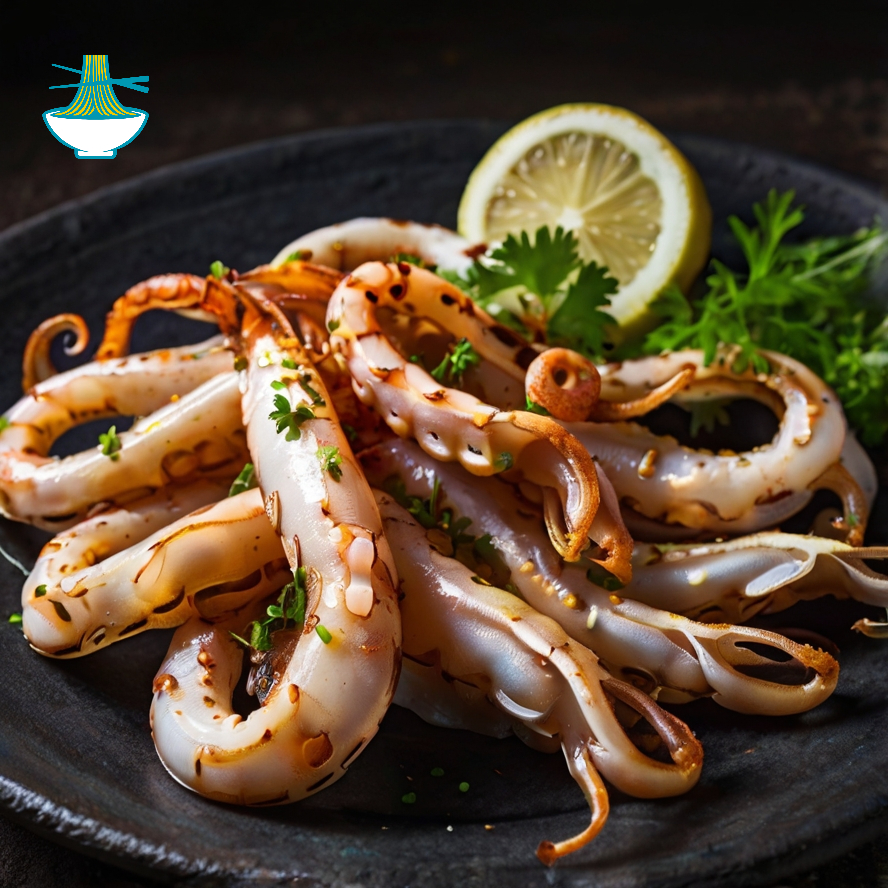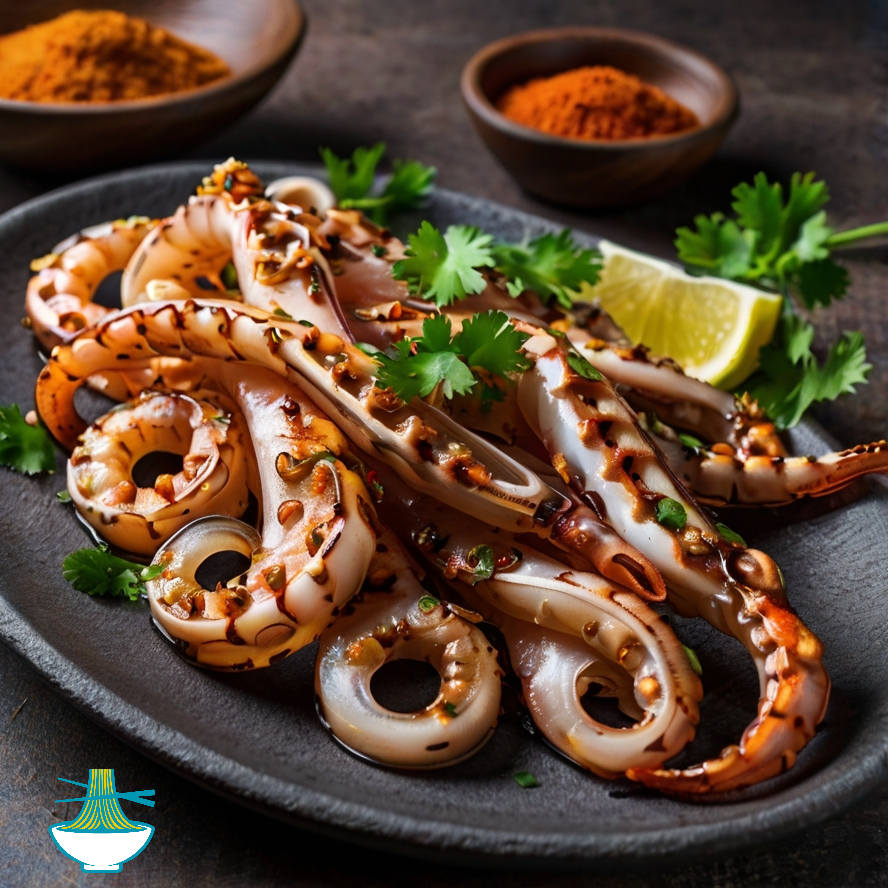Grilled Squid is a delectable seafood dish that combines the tenderness of squid with the bold flavors of local spices. Packed with essential nutrients like protein, vitamin B12, and omega-3 fatty acids, it supports muscle growth, brain health, and heart function. However, grilling at high temperatures can create compounds that may have adverse effects if consumed in excess. This dish strikes a balance between nutrition and flavor, offering a rich source of selenium and antioxidants to boost immunity and protect cells.
Ingredients:
- 500g fresh squid, cleaned
- 2 tablespoons olive oil
- 2 teaspoons smoked paprika
- 1 teaspoon garlic powder
- ½ teaspoon cayenne pepper (optional)
- Salt and black pepper to taste
- Fresh lemon wedges for serving
Instructions:
- Clean the Squid: Start by cleaning the squid thoroughly. Begin by cutting off the head and tentacles, then remove the innards and the ink sac. Use a small knife to carefully peel off the skin and discard it. Once cleaned, slice the squid into rings, or leave it whole depending on your preference.
- Prepare the Marinade: In a small mixing bowl, combine 2 tablespoons of olive oil, 2 teaspoons of smoked paprika, 1 teaspoon of garlic powder, ½ teaspoon of cayenne pepper (optional for a spicy kick), salt, and black pepper. Stir well to create a smooth marinade.
- Marinate the Squid: Coat the squid with the prepared marinade. Ensure that each piece is evenly covered. Let the squid marinate for 15-20 minutes to allow the flavors to infuse. This marinating time will enhance the squid's natural sweetness while adding a smoky depth.
- Preheat the Grill: Preheat your grill or grill pan to a medium-high heat. It's important to ensure the grill is hot before placing the squid on it to achieve a perfect sear and prevent sticking.
- Grill the Squid: Once the grill is ready, place the squid on it. Grill for 2-3 minutes on each side until it is lightly charred and tender. Be cautious not to overcook the squid, as it can become tough and rubbery. The key is to cook it quickly at a high temperature to keep it soft and succulent.
- Serve and Enjoy: After grilling, remove the squid from the grill. Serve it hot, garnished with fresh lemon wedges on the side for a citrusy burst of flavor. The lemon will complement the smoky, savory notes of the grilled squid.
How to Choose Fresh Squid
When selecting squid at the market, look for these key indicators to ensure freshness:
- Appearance: Fresh squid should have a shiny, translucent body. The skin should not be slimy or discolored.
- Smell: The squid should have a clean, ocean-like smell. Avoid squid with a strong or fishy odor, as this indicates it may be spoiled.
- Eyes: Check the squid's eyes. They should be clear and firm, not sunken or cloudy.
- Texture: Fresh squid will feel firm to the touch, while older squid may be soft or mushy.
Comparison with Other Cooking Methods
Grilling is a popular method for cooking squid because it brings out its natural flavor and creates a slightly smoky, charred exterior. However, it’s useful to compare this method with others:
- Boiling: Boiling squid results in a tender texture but lacks the charred flavor of grilling. It's a gentler cooking method that preserves the squid's natural flavor.
- Frying: Frying squid gives it a crispy texture, but it can sometimes result in a greasier dish. Additionally, the oil may mask the subtle flavor of the squid.
Grilling is an excellent balance of retaining the squid’s delicate texture while adding a smoky flavor that enhances its natural sweetness. However, the choice of cooking method depends on personal preference, dietary restrictions, and the desired flavor profile.
Precautions and Warnings
While grilled squid is a healthy choice for most people, there are some precautions to keep in mind:
- Cholesterol: Squid contains moderate amounts of cholesterol. If you're concerned about cholesterol intake or have a condition like hyperlipidemia, it's best to consume squid in moderation.
- Overcooking: Squid tends to become tough and rubbery if overcooked, so it’s essential to avoid cooking it for too long. Just 2-3 minutes per side on high heat is sufficient.
How to Serve Grilled Squid
Grilled squid pairs well with a variety of side dishes that complement its smoky flavor:
- Salads: A fresh green salad with a citrus vinaigrette can balance the richness of the squid.
- Rice or Couscous: A side of rice or couscous adds texture and helps absorb the flavors from the squid.
- Vegetables: Roasted vegetables, such as asparagus, zucchini, or bell peppers, pair wonderfully with grilled squid.
Health Benefits of Protein and Omega-3
Squid is an excellent source of lean protein and essential omega-3 fatty acids. Here's how they benefit your health:
- Protein: Squid is rich in protein, which is crucial for muscle repair, growth, and overall body function. It supports tissue regeneration and helps maintain healthy skin, hair, and nails.
- Omega-3 Fatty Acids: These healthy fats play a vital role in supporting brain function, reducing inflammation, and maintaining heart health. Omega-3s have been shown to improve memory, lower cholesterol, and reduce the risk of heart disease.
Frequently Asked Questions (FAQs)
- Can I use other types of seafood instead of squid? Yes, you can substitute squid with other seafood like shrimp, scallops, or octopus. However, each type of seafood has its own texture and cooking requirements, so adjustments in cooking time may be needed.
- Is grilled squid suitable for low-fat diets? Grilled squid is a low-fat food option, especially when prepared with minimal oil. It is rich in protein and omega-3 fatty acids, making it a great choice for a heart-healthy diet.
- How can I store grilled squid? Grilled squid can be stored in an airtight container in the refrigerator for up to 2 days. It’s best enjoyed fresh, but leftovers can be reheated or added to salads and pasta dishes.
- Is grilled squid safe for people with food allergies? Squid is safe for most people, but it is a common allergen. If you have a seafood allergy, avoid squid and consult a doctor before consuming any seafood.
- Can I replace olive oil with butter or another fat? Yes, you can substitute olive oil with butter, avocado oil, or coconut oil. However, olive oil is the healthiest choice due to its heart-healthy fats and antioxidants.
- Is it better to marinate squid for longer? Marinating squid for 15-20 minutes is typically sufficient to enhance flavor. While longer marinating may intensify the taste, it can also make the squid too soft. So, marinate it for a shorter time for the best texture.
- Can I serve grilled squid with sauces? Yes, grilled squid pairs beautifully with sauces like garlic butter, tahini, or a tangy lemon-based sauce. These sauces can complement the smoky flavor and add richness to the dish.
- What’s the best way to store leftover grilled squid? If you have leftover grilled squid, wrap it tightly in plastic wrap or place it in an airtight container. Refrigerate it for up to 2 days. To reheat, warm it gently in a skillet over low heat to avoid overcooking.

Nutritional Values and Benefits
1. Fresh Squid (500g)
- Calories: 230
- Protein: 44g
- Fat: 5g
- Carbohydrates: 1g
- Vitamins and Minerals:Vitamin B12: 2.5mcg (104% DV)
- Selenium: 68mcg (123% DV)
Nutritional Benefit: Squid is an excellent source of lean protein and vitamin B12, which supports nerve health. It is also rich in selenium, a powerful antioxidant.
2. Olive Oil (2 tablespoons)
- Calories: 240
- Fat: 28g
- Vitamins and Minerals:Vitamin E: 4mg (27% DV)
Nutritional Benefit: Olive oil is a heart-healthy fat that reduces inflammation and provides essential antioxidants for overall wellness.
3. Smoked Paprika (2 teaspoons)
- Calories: 12
- Carbohydrates: 2g
Nutritional Benefit: Paprika adds a smoky flavor and contains antioxidants like capsaicin, which support metabolism and reduce inflammation.
4. Garlic Powder (1 teaspoon)
- Calories: 10
- Carbohydrates: 2g
Nutritional Benefit: Garlic powder provides allicin, which supports heart health and boosts the immune system.
5. Cayenne Pepper (½ teaspoon)
- Calories: 3
Nutritional Benefit: Cayenne pepper contains capsaicin, known to enhance metabolism and support digestion.
6. Lemon Wedges (1 medium lemon)
- Calories: 17
- Vitamin C: 31mg (51% DV)
Nutritional Benefit: Lemon adds a burst of vitamin C, promoting immune health and aiding in iron absorption.
Merged Nutritional Benefits: Grilled Squid is a protein-rich dish enhanced with heart-healthy olive oil and spices rich in antioxidants. This dish offers a combination of essential vitamins and minerals, promoting overall wellness while delivering a smoky, flavorful experience.


Comments